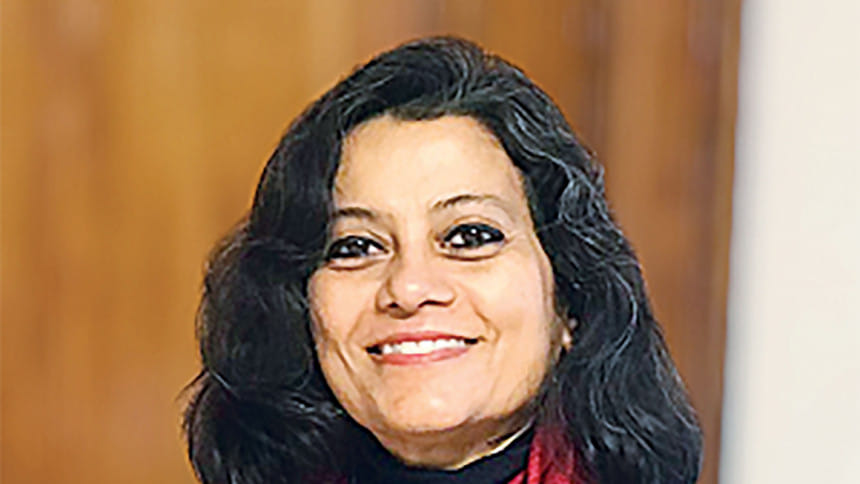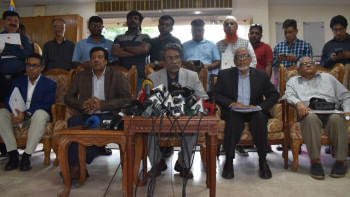Teesta Water Sharing: Dhaka, Delhi should look for ‘creative solution’

Bangladesh and India should find a "creative solution" to the Teesta management as Dhaka has long been demanding its share of water from the transboundary river, said Prof Sreeradha Datta of OP Jindal Global University.
Given the strong bilateral relationship between the two countries, the border killings are "shameful", she said.
"India has not effectively responded to Bangladesh's long-standing demand for Teesta water. I think the leaders of the two countries will find out a creative solution to this problem," she told The Daily Star yesterday.
Her comments came a day before the bilateral meeting between Prime Minister Sheikh Hasina and her Indian counterpart Narendra Modi at the Hyderabad House in New Delhi.
Dhaka and Delhi failed to seal the Teesta deal in 2011 due to West Bengal Chief Minister Mamata Banerjee's last-minute opposition.
People in Bangladesh's northern region currently suffer from a shortage of irrigation water in the dry season. There is no respite for them during the monsoon either as they experience flooding.
In 2020, Bangladesh asked China to support the implementation of nearly $1 billion Teesta River Comprehensive Management and Restoration Project. China has shown interest in the project.
During a visit to Dhaka on May 9 this year, Indian Foreign Secretary Vinay Mohan Kwatra told Foreign Minister Hasan Mahmud that his country was interested in financing the Teesta project.
On June 13, Hasina told parliament that her government was considering a proposal for a detailed feasibility study for the Teesta project as per recommendations from China.
The premier is likely to visit China on July 9-12. During that tour, Dhaka and Beijing may discuss the Teesta project, said diplomatic sources.
Sreeradha, a professor of Jindal School of International Affairs at OP Jindal Global University in Haryana, yesterday said India would not want to see any "unfriendly country" implementing any project close to its border.
"Prime Minister Sheikh Hasina has a very good understanding of Indian security concerns. So, it is expected that Narendra Modi and Sheikh Hasina will go for a mutually acceptable agreement," said Sreeradha, who researches into India's neighbouring countries and South Asian security.
She expressed optimism that India will realise the importance of Bangladesh's priority project.
About the killing of Bangladeshis by Indian Border Security Force, she said identifying and addressing the root causes of cross-border smuggling and trespassing are crucial.
Though India approved line of credits of about $8 billion for Bangladesh, only about $1.7 billion has been disbursed so far because of the difficult terms and conditions, Sreeradha said.
As Bangladesh seeking fresh loans, India should offer credits under new terms and conditions, she added.
She said India's northeast region is much more secure today and is developing because of Bangladesh's support in addressing the security concerns.
According to Sreeradha, the road, rail and water connectivity between Bangladesh and India has seen a significant progress, thanks to Bangladesh's support.
"All these are advancing the regional and sub-regional cooperation."
However, the visions of India and Bangladesh to have access to ASEAN nations via Myanmar have been affected due to the conflict in Myanmar, she observed.
"In South Asia, India attaches highest priority to its relations with Bangladesh. Addressing each other's concerns can greatly help promote the regional value chain, stability and peace," she said.
She hoped the two top leaders will advance this agenda.
About reducing the Bangladesh-India trade gap, Sreeradha said Bangladesh should produce new products that are in demand in India.
Bangladesh also needs to improve its investment environment to attract more investment from India, she added.
"Though there is a Special Economic Zone in Chattogram for India, red tape, corruption and other governance issues keep Indian investors away from investing in Bangladesh," she said.
India's exports to Bangladesh are worth $12 billion a year against Bangladesh's exports of about $2 billion to India.

 For all latest news, follow The Daily Star's Google News channel.
For all latest news, follow The Daily Star's Google News channel. 



Comments